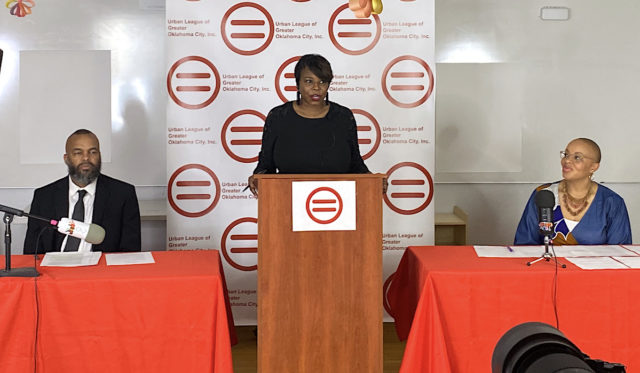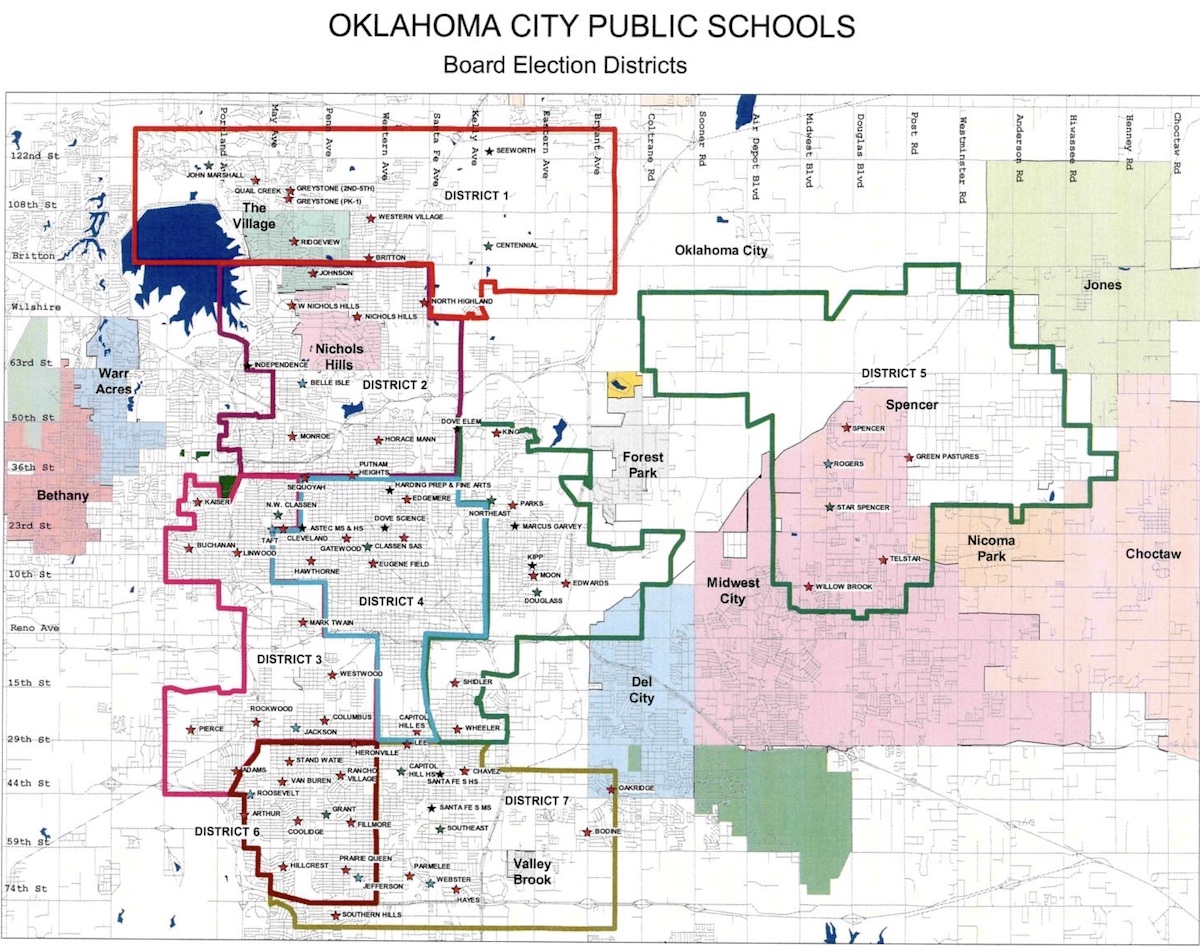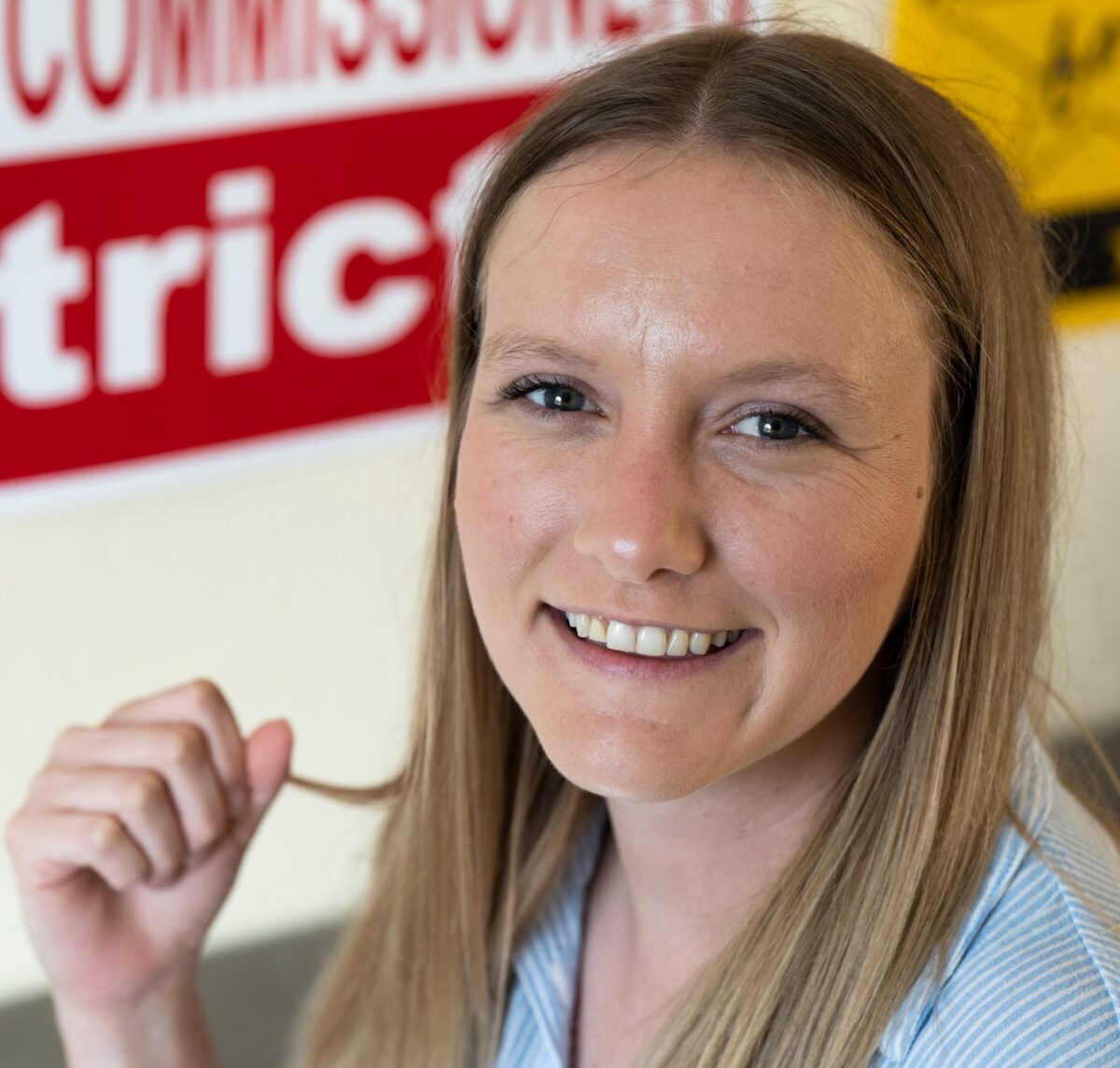

During a forum held Tuesday evening ahead of the April 5 Oklahoma City Public Schools Board of Education election, candidates Dr. Sharri Coleman and Adrian Anderson discussed the use of police department resource officers in schools, critical race theory and the biggest challenges facing the district.
Coleman and Anderson are running to fill the OKCPS District 5 seat being vacated by Ruth Veales, the district’s longest-serving board member, who has been on the board since 2010 and has decided not to run for reelection.
Coleman is a former OKCPS science teacher who currently serves as the internship counselor for Millwood Public Schools. She is a doctor of podiatric medicine and serves as an adjunct professor of African American studies at the University of Oklahoma.
She kicked off the evening’s forum (video embedded below) by addressing a recent article in The Oklahoman that said Coleman changed the address on her voter registration from a home about two miles outside the District 5 boundaries to a rental house within boundaries only three days before she filed to run for the board seat.
According to state law, school board candidates must live in and be registered to vote in the the district where they are running for at least six months prior to the first day of campaign filing.
“I would love to say that the article that was written today about my residency — everything is OK,” Coleman said. “I lived in the district and have lived in the district for years. Due to Pathways to Greatness, I was out of it temporarily. P2G went into effect a couple of years ago, and I made the necessary steps that I needed to take to make sure I was in compliance.”
The P2G plan was approved by the school board in 2019 with a goal of aligning OKCPS facilities and resources with instructional needs. The plan involved the implementation of new school attendance zones, the closing of a dozen school sites and a change in feeder patterns.
Throughout the evening, Coleman touted her campaign platform, which she has branded as Learn to LEAP. The acronym references leadership, equity, accessibility and community partnerships.
Anderson, a financial professional with Prudential Financial Company, is an OKCPS graduate with children who currently attend school in the district. Anderson said he has been a supporter and volunteer in OKCPS for more than 10 years.
“My platform is, pretty much, together we can continue the work that has already been in place,” Anderson said. “For 14 years, I’ve been doing the work in Oklahoma City Public Schools. I’ve been doing the work learning how to build relationships, being able to communicate with district leaders, teachers and administrators, still volunteering in schools, learning the mental health challenges and learning the needs of our students and families.”
The evening’s forum was hosted by the Urban League of Oklahoma City’s community convening and social justice department, and it was moderated by Oklahoma City Ward 7 Councilwoman Nikki Nice.
District 5 covers parts of northeast Oklahoma City, Midwest City and Spencer. Polls will be open from 7 a.m. to 7 p.m. on Tuesday, April 5, 2022. Early voting is open from 8 a.m. to 6 p.m. Thursday and Friday.
Coleman: ‘Black and brown children are often times over- policed’

Anderson said one of the biggest challenges he sees facing OKCPS involves helping students recover from the effects of the coronavirus pandemic, particularly its impact on reading proficiency and academic performance.
“We want to assist teachers and assist the schools and do whatever we can do to make sure we address that,” Anderson said. “That’s the main concern right now. Trying to catch up and bridge the gap that was created by COVID.”
Coleman said she believes she has great ideas but does not want to assume she knows what will be best for the entire district or even the individual schools she would represent.
“I do know that it’s my responsibly to listen,” Coleman said. “Part of that is making sure my listening ears are turned on and I’m honed in on what the needs are for administrators, for students, for the school and am taking that back to the board and making sure that we together can make sure that every child’s need is met in the district.”
Candidates also discussed the use of school resource officers — called SROs — who are law enforcement professionals assigned to work in schools.
Coleman said that if school resource officers are used, they should be part of a wider community partnership approach and that the district should consider how other community partnerships and services for students could help eliminate the need for policing in schools.
“I also think it’s the way we look at discipline, especially with Black and brown children,” Coleman said. “That’s going to come from the board, administrators and [from the question of] how do I meet the needs of the children? I’m not saying get rid of the resource officers, I’m saying utilize them. Make sure they’re part of the fun things in school as well.”
Anderson said he had experiences with a school resource officer while working at Star Spencer High School as a behavioral health and rehabilitation specialist. Anderson said that SRO had become part of the school staff.
“His purpose wasn’t to impose his will or intimidate the students, it was to help the students,” Anderson said. “I think (we should be) getting a plan together with the administration on the purpose of why we’re here and implementing that resource officer in as many activities and integrating that officer with maybe even decision-making with how we engage with students. He became more than an officer. He became like a brother, uncle or father in some cases.”
Anderson and Coleman were also asked to discuss the disproportionate number of Black and brown students who face suspension in the district.
“Disproportionately, from past experiences, Black and brown children are often times over-policed,” Coleman said. “We’ll have the capability to make sure we have the rules, statutes and all of those standards put in place. Part of what I know and part of my background in understanding Black and brown children is bringing that story to the table. How can we flip it and make sure we’re affirming our children instead of punishing them?”
Anderson said he had previously been invited to take part in a task force of district stakeholders to address the issue.
“If you’re really here about helping kids and educating children, you need to remove any bias you have in concern of color or ethnicity or any background that children come from,” Anderson said. “That’s where I want to approach it from, a love standpoint.”
Anderson: ‘I do not support vouchers’
Candidates also touched on their thoughts regarding hot button legislation from this session and last, including the Oklahoma Empowerment Act, a private school voucher program that was voted down by the Senate last week.
Anderson called his opposition to the Oklahoma Empowerment Act a “no-brainer.”
“I do not support vouchers,” Anderson said. “This voucher program takes away from public education. I would like to challenge our legislators to write a bill to improve funding in public education.”
Coleman said the schools sitting in District 5 would have received less funding if the Oklahoma Empowerment Act had been passed into law.
“We want to make sure all the public funds we get from taxpayer money goes to meeting the needs of the children, especially here in District 5,” Coleman said.
Coleman and Anderson also said they oppose HB 1775, which bans the teaching of certain concepts about race and gender in Oklahoma public schools. The bill has been described as a ban of “critical race theory,” though it does not use that term. Critical race theory is an academic framework that emerged from legal scholarship and examines how racial bias can be perpetuated through laws and institutions.
“Critical race theory is an academic concept. It’s more than 40 years old. It didn’t just come in the last five years,” Coleman said. “It is used by law students in the 70s and 80s. CRT is not being taught to eight- and 10- and 12-year-olds in the classroom.”
She added that she believed the first portion of HB 1775 “is more detrimental than all the other things.”
“The first part of that bill says no teacher would have to undergo diversity training,” Coleman said. “I think that does a disservice to the teachers and to the students.”
Anderson echoed Coleman’s thoughts on HB 1775.
“I think we have to stay focused on what the real issues are, what the real concerns are and make sure we’re educating our students on a high level,” Anderson said.
Watch the OKCPS District 5 forum





















